When a pool starts losing water, it is not unreasonable to start panicking and imagine the thousands of dollars that you may need to spend to dig up pipework, replace the liner or do other major works.
All pools lose water and it is easy to conclude that you must have a leak. But actually, the most likely reason for your pool losing water is through evaporation. A pool can lose much more water by evaporation than you might imagine, particularly at certain times of the year and when certain conditions exist.
For the first year or two, I never had to top up my pool, as it had an automated top-up system. Then that system stopped working, so until I fixed it, I needed to top the pool up with water from a hose pipe whenever it went down.
It certainly surprised me how quickly the water level in my pool dropped then. I had to top it up twice a week, so I began to think that there must be a leak that didn’t show up before because it was constantly being automatically topped up.
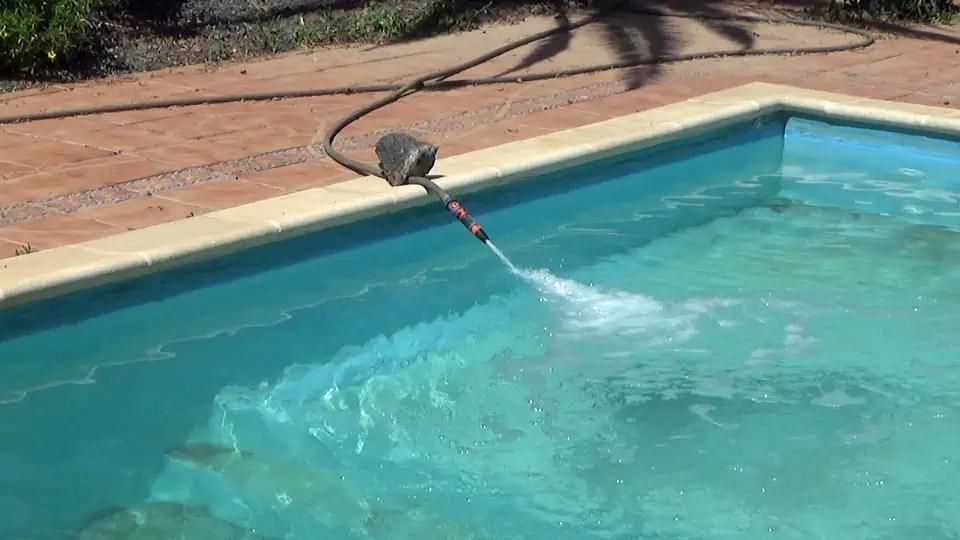

So a friend explained the “bucket test” to me so I could prove whether I had a leak or not – and I was utterly convinced I had one, I can tell you. I carried out the bucket test (see below for instructions), and to my amazement and complete relief, it proved that I didn’t leak at all.
Reasons for a pool losing water
There are a number of reasons why a pool might lose water, which could happen individually or in combination.
Evaporation
It is incredible how much water a pool can lose due to evaporation alone. The amount of water loss can vary quite dramatically depending on various factors such as wind, humidity, air temperature and water temperature.
This variability is one of the reasons that people often think that they must leak. They know there has been twice the water loss this month, so it must have been a leak. But it may be that the air temperature was low last month, the water was cooler, and it was not very windy. However, it has been hot and humid this month with lots of wind, resulting in a higher evaporation rate.
A normal pool evaporation rate can be as much as 0.25-0.5 inches per day (2-4 inches per week) due to evaporation alone. Obviously, if your pool is losing 10 inches a week, there must be at least other causes.
Bucket Test
The best way to check if your pool losing water due to evaporation is to carry out the “bucket test”. Read my full instructions on carrying out the bucket test to learn more.
Basically, you put a bucket on a step in the pool (or on something to raise it up if you don’t have steps) so that a few inches of it is out of the water. Then, fill it to an inch from the brim with water – ideally to the same level as the pool water outside. You then mark the pool’s water level on the outside of the bucket and the water in the bucket on the inside.
Leave it for a few days (ideally), then measure the water loss inside and outside the bucket. If the levels have gone down by the same amount, or pretty close, then the water has been lost through evaporation. If the pool has lost significantly more, then there is another problem.
If this test confirms that you are losing water due to evaporation, you can reduce this. See the section below on how to do so.
Backwashing
When you backwash a pool the water does not return to the pool but is expelled either to the drainage system or into your yard, so the water level will drop to some extent. However, as you generally only backwash for a few minutes, this is unlikely to affect the water level significantly.
Vacuuming to waste
Just like backwashing, when you vacuum a pool to waste water does not return to the pool but instead is expelled. However, unlike backwashing, the process of vacuuming to waste takes significantly longer, so a large drop in the pool’s water level will occur. I tend to lose about 4 inches of water every 10 minutes or so when I vacuum to waste.
Kids
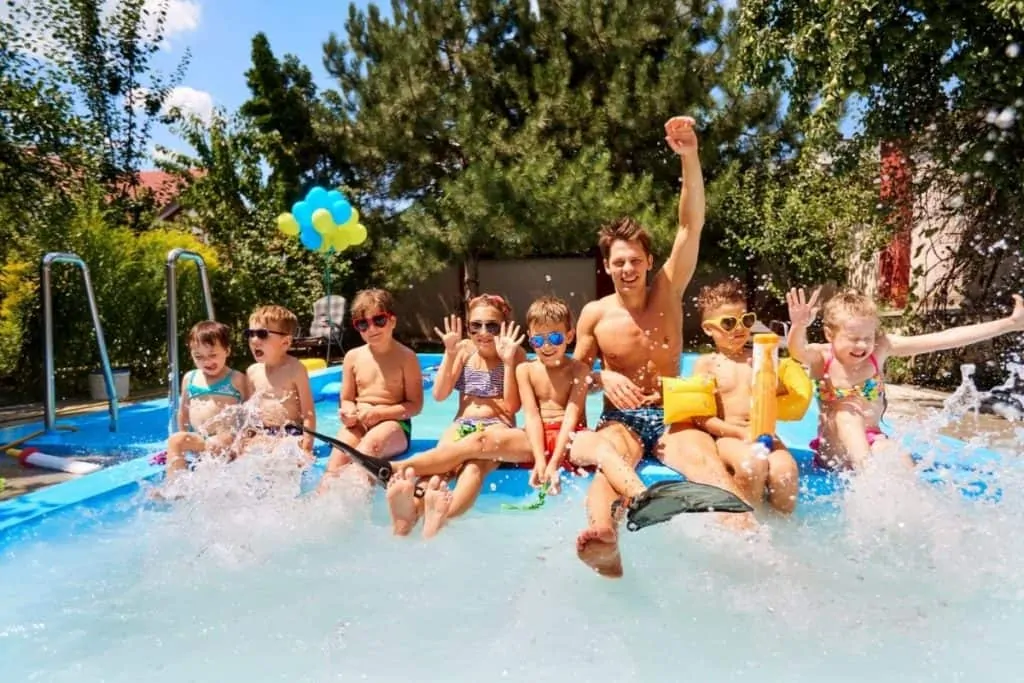
This may seem like an unlikely reason (well, impossible if you don’t have children using your pool, of course), but if you have kids using the pool frequently, it can affect the water level.
Children tend to be forever getting in and out of a pool, running around, dripping water as they go. Then they jump back, splashing water as they go, particularly if they are fond of playing cannonballs.
The worst scenario – a leak
If you have eliminated all of the other possible causes, then you will have to consider the unpleasant possibility that your pool may actually have a leak. I would suggest that you do this pretty quickly, as the longer you leave it, the worse it is likely to get and probably the more expensive it will be to repair.
Finding a pool leak
Pool leaks really fall into two categories, either external in the pipework or in the pool itself:
Leaks in the pool’s plumbing
Some of the pool’s plumbing will be underground, so it is less easy to check for leaks, but much of it is above ground (well, all of it in an above-ground pool, of course). So, first of all, check all of this above-ground plumbing for leaks. This includes:
- the pipework from the skimmer/s to the pump
- the pipework from the main drain to the pump
- the pump itself
- the multiport valve (if you have one)
- the filter (sand, DE or cartridge)
- If you have solar pool heating, check all of this. Last year, one of the solar heating sheets on my roof had a small leak.
- as much of the pipework that returns to the pool as you can see
If any major leaks are likely to lower your pool water level significantly, they should be easy to see. If there are, you are lucky, as they will also be relatively easy to fix.
If everything is dry and leak-free, then sadly, things will not look good to you.
To check to see if you leak the plumbing underground, you can try to plug the skimmer main drain, and the pool returns so no water can get into it from the pool. If the pool level no longer drops at the same rate, it would indicate that the problem is probably in the underground plumbing system.
Leaks in the pool’s structure or fittings
If you have now reached the conclusion, through a process of elimination, that the leak must be in the pool structure itself, you have two options. You can try to detect the source of the leak yourself by using a pool leak detection kit (see below), or you can call a pool professional.
Using a detection kit, you need the water to be as still as possible, so turn off your pool pump, shut any valves to the skimmers, pool drain, etc. and then leave it a while. Ideally, there should also be little or no wind that could move the water in the pool.
You then systematically go around the pool checking around all the fittings, such as :
- the skimmer housing
- the skimmer pipe that goes from the skimmer to the pump and also the equalizer if you have two holes in the skimmer
- the main drain – not an easy task as it is at the bottom of your pool
- pool lights – check around the fitting
- returns – check around the return jets
- the pool itself, which could be a vinyl liner, tiles or fiberglass – the most common places are in the corners and where the sides meet the floor
These are basically a bottle of dye and a syringe applicator with a very fine nozzle. When the plunger is depressed, a very thin line of dye is released.
You gently put the syringe near somewhere in the pool you suspect could be leaking and release a small jet of dye. If the dye gets sucked into the fitting or wherever you are checking, then there is a leak.
Pool leak detection kit available on Amazon
If you find a leak
Depending on where the leak is, you may be able to get away with a simple fix by using specialist leak-sealing products, which you can use without draining the pool. There are a few leak-sealing products available, none of which I can recommend (as, fortunately, I haven’t had a leak yet), but they seem to have some good reviews.
- Nano Tech Q-10 Underwater Seal & Lock
- Atlas Epoxy Pool Putty Set
- Underwater Magic Sealant
- AQUABOND Underwater Pool Repair Epoxy Kit
If you find the pool losing water around a skimmer housing or a pool return you may be able to just lower the water level below that level then remove and reseal that particular fitting.
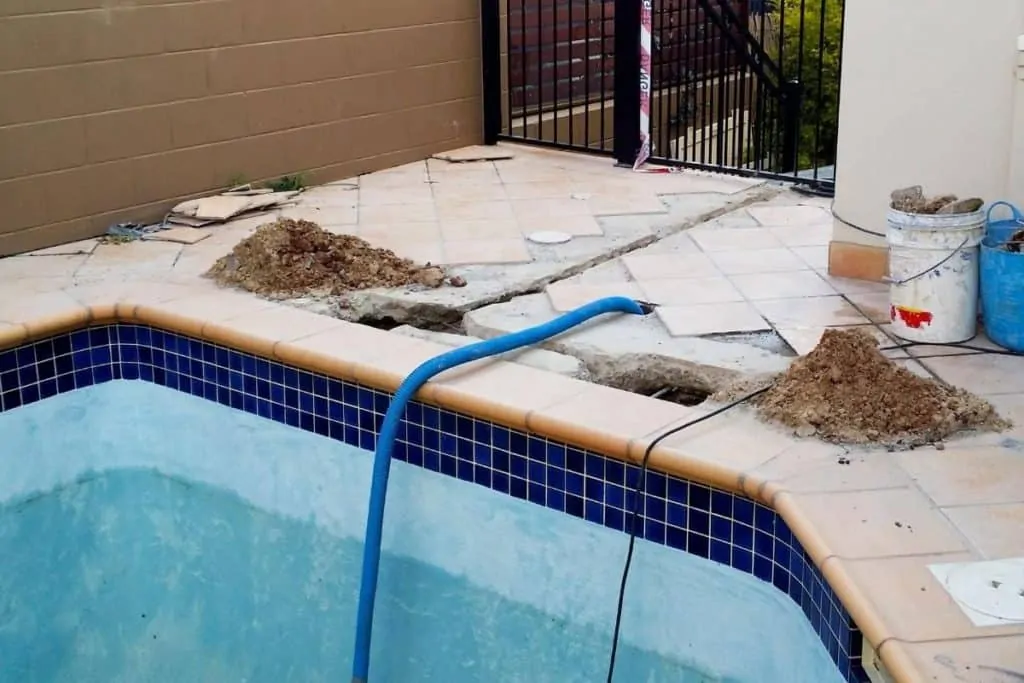
You may not actually find a leak, or, even if you do, for many leaks, you will just have to bite the bullet and call in a pool repair professional. If you require a new liner or something similar, then it could be quite expensive, but it might not be as bad as you think. Obtain more than one estimate to ensure you get a good deal.
How to reduce loss by evaporation
One of the best ways to reduce the amount of water your pool loses due to evaporation is to use a solar pool cover. Although the main function of solar pool covers is to retain heat and allow the pool water to heat up faster, they also significantly reduce water evaporation.
This is no surprise since one way a pool loses heat is through the evaporation process.
You can also try a liquid pool cover which should reduce the rate of evaporation.
Keeping the pool topped up automatically
If you do not have a built-in automatic pool leveler then you can easily install a Rola-Chem Sentry Automatic Pool Water Leveler which just attaches to a hose and tops the pool up whenever the level goes down. See the video below:
My top 3 pool cleaning tools
These are the pool cleaning tools I have found the most useful since I have had my pool.
Step and corner vacuum brush
This is a really useful tool for getting into the areas that a standard vacuum head simply cannot reach. Aquatix Pro Pool Step & Corner Vacuum Brush
Leaf rake net
If, like me, you get plenty of leaves at the bottom of your pool then a good leaf rake/net is a must. The Stargoods Pool Skimmer Net gets under the leaves easily.
Robotic pool cleaner
These are quite expensive and it was a number of years before I bit the bullet and bought one. I have never regretted it. The Dolphin Nautilus CC Plus is the most recommended pool cleaning robot on all of the pool forums. It not only cleans the bottom of the pool but also the sides and the waterline.
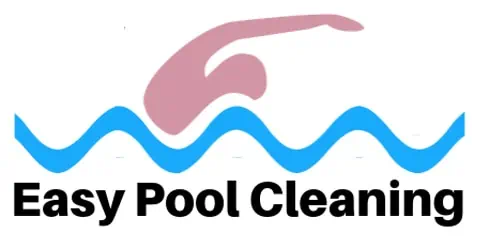

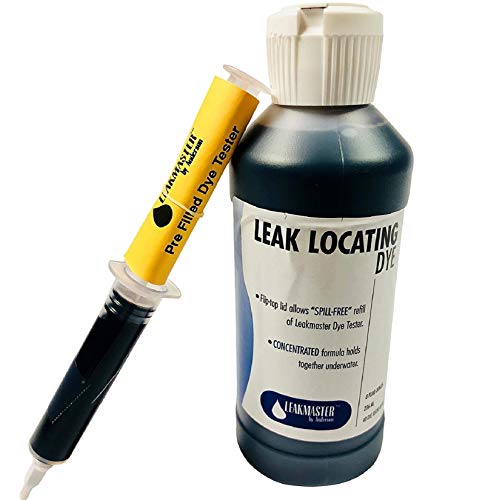
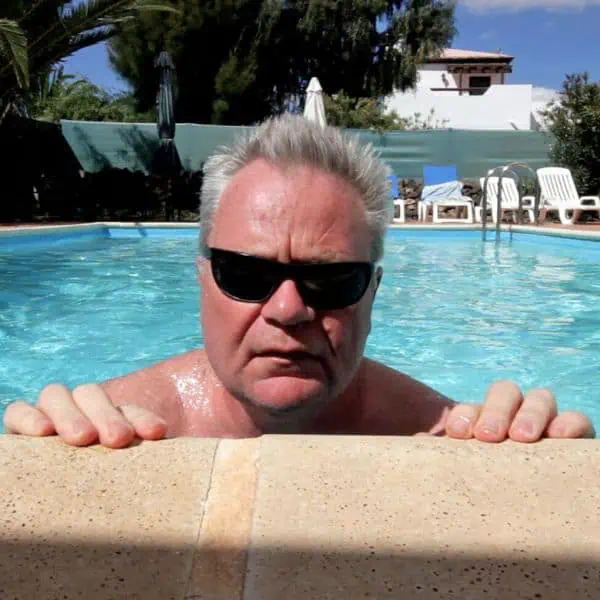
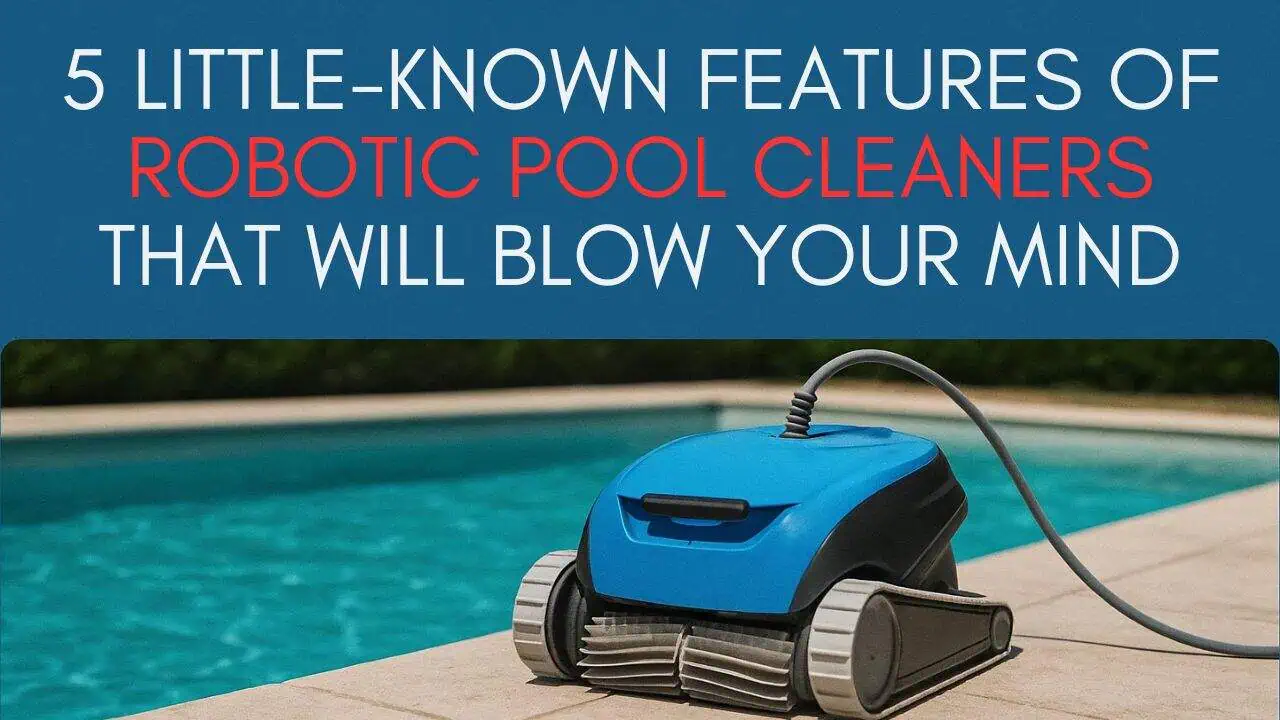
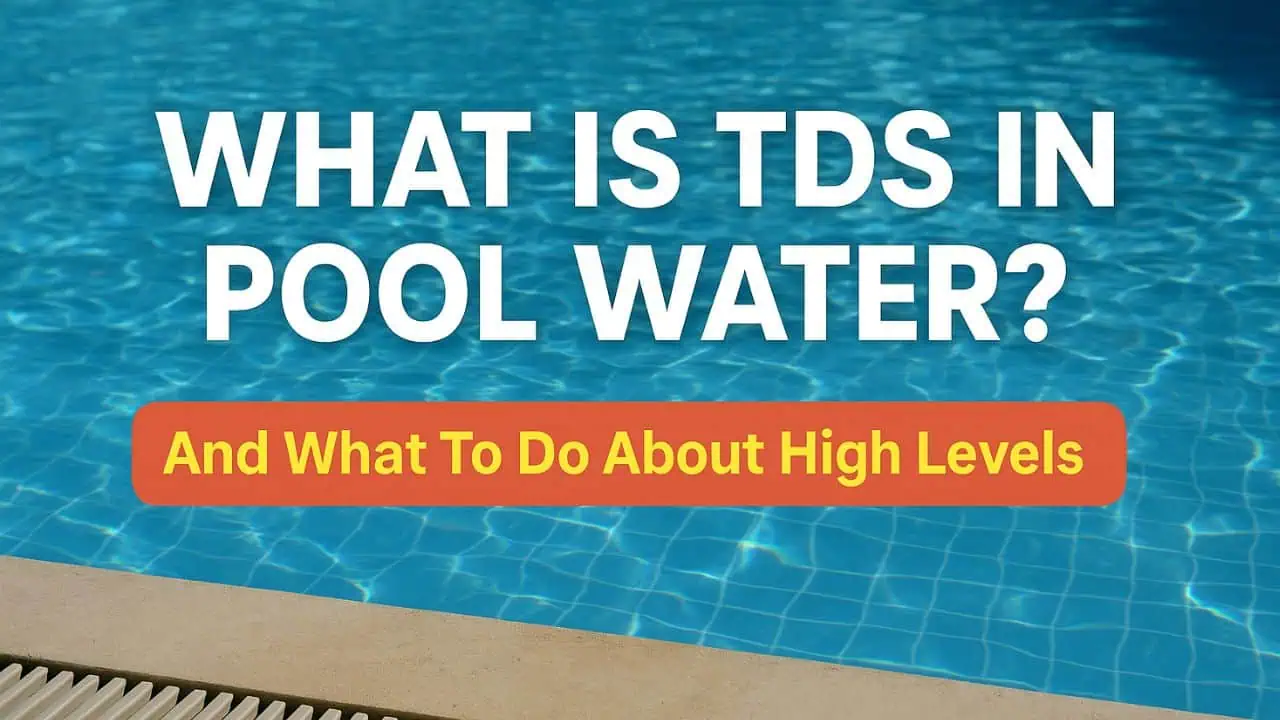
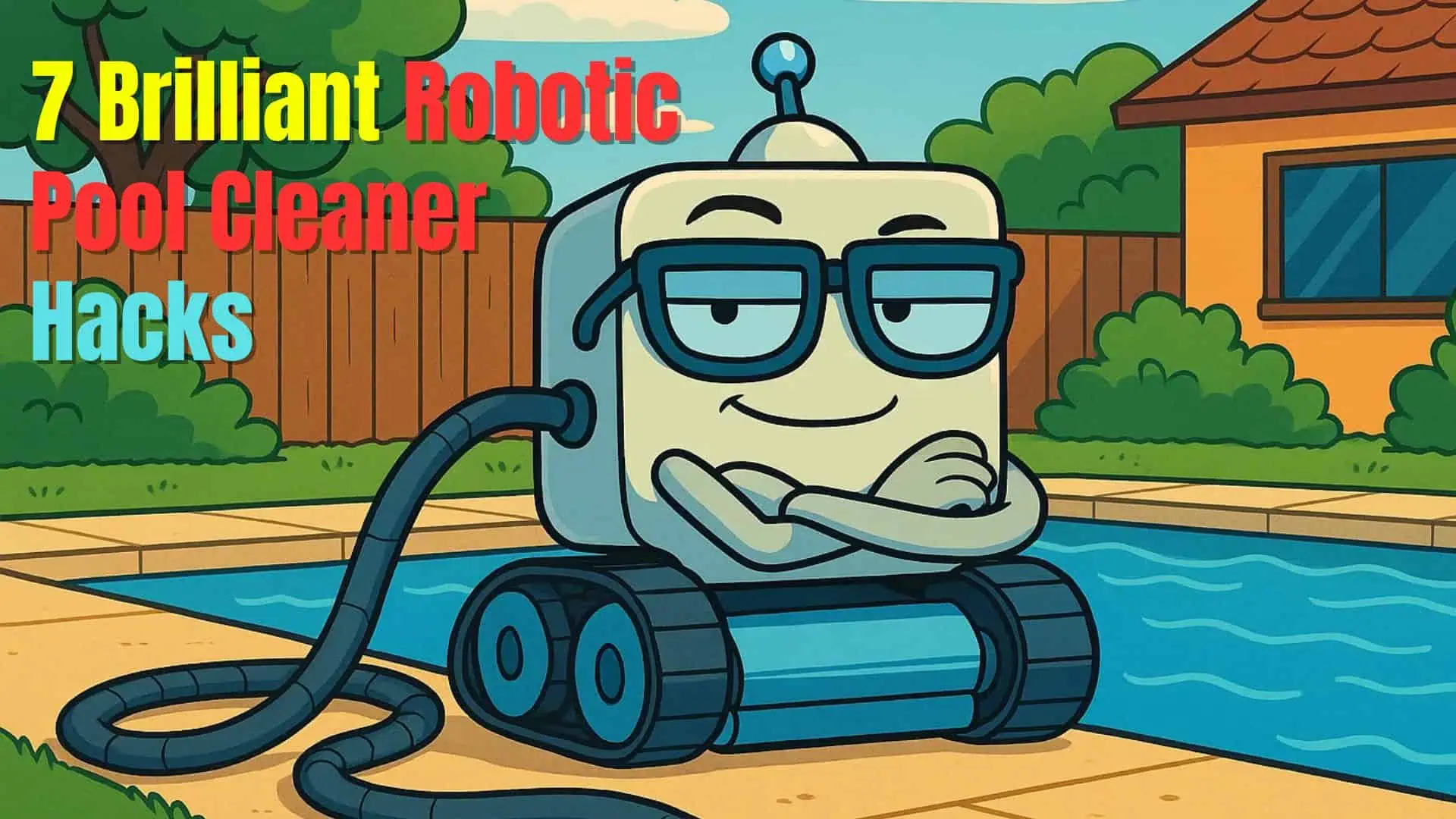
Leave a Reply